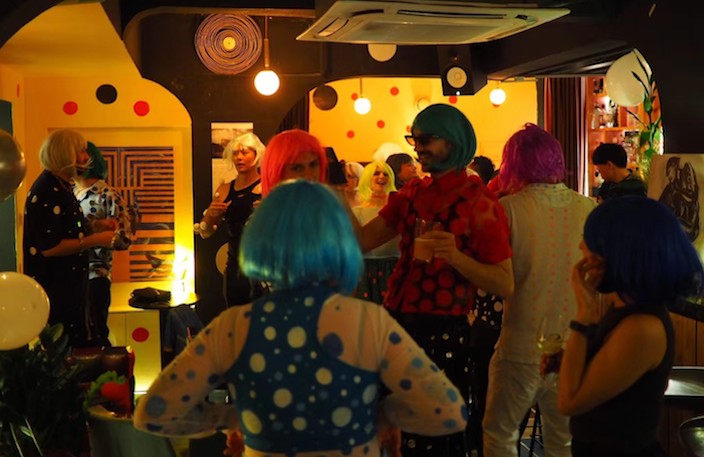To the educated drinker, it’s a matter of common knowledge that scotch must be made of malted barley, aged in oak for no less than three years, and most importantly be made in Scotland. For a whiskey to bear the name bourbon it should be distilled from a mash consisting of no less than 51% corn. A true fiancé must originate from the Fiancé region of France, lest it be simply a sparkling boyfriend.
Descending from one’s high horse, however, we must pay homage to the agriculturalists who have been imbibing in the fruits of their labor for thousands of years. The restrictions of nomenclature never mattered to the paisans who meticulously perfected their local brew, those who imbued the taste of home and pride and familiarity to the table wine of the land they farm together.
Moët & Chandon, famous for producing the famous Dom Pérignon champagne, was founded in 1743. Image via Wikimedia
The essence, as we will henceforth call it, is the subtle hue that a spirit wears when it flaunts the more decorative flavors that its master carefully selected in the pursuit of perfection.
Hence we realize that the restrictions of controlled origin alcohol are a product of capitalism — rules set in place to ensure that the old guard may hold court over the production of the people’s drink. And as multinational liquor conglomerates like LVMH and Anheuser-Busch gulp ever more greedily from the global alcohol supply, the subtle beauty of small batch production becomes harder and harder to find.
But there is hope, as we recently discovered, in the untethered alchemy of gin. According to official regulations on the classification of spirits from the European Parliament, virtually the only stipulation regarding gin be that it is predominantly flavored with juniper berries. Juniper is an aromatic conifer (think Christmas tree) which produces small bright purple berries that are packed with a fresh, sweet, citrusy and medicinally herbaceous flavor. However, the EU regulations only specify that a spirit of “agricultural origin” must be produced “in the presence of juniper berries and of other natural botanicals.” This means that the barriers-to-entry into the craft gin sphere are removed and true artisanal curiosity can prevail.

Juniper berries come from a coniferous shrub and have long been used for medicinal purposes. Image via Pexels
In the past decade, this freedom has allowed for craft gin distilleries to open in all corners of the world. From Finland to France and from Seoul to Cape Town, most craft gin producers use locally sourced or foraged botanicals to imbue a unique palette of flavors that represent the terroir from whence it came.
But how do we know this? It was only recently that we were turned onto the notion that there are gins so sophisticated in their bouquet that they should be sipped like fine brandy.
Tucked away on a quiet laneway only a stones throw from Guangzhou’s Taikoo Hui is DEEP.

Image via DEEP
This warm and intimate space is one of the city’s well kept secrets as it calls only the most dedicated epicureans. On the menu: craft gin and craft beer. DEEP’s owner Ann Chi explains that the two choices on offer both represent the fēngwèi (风味) or special local flavor that emerges from carefully chosen ingredients. And it is here, opposite a tall shelf of obscure handpicked gin, that we fall in love with the spirit.
“Some gins are best with tonic, some are good for cocktails and some should be drank straight,” she says as she dashes the colorless spirit over a giant shard of ice in a tumbler. The gin she has chosen for us is Sorgin, a French distilled gin named after the Basque word for ‘witch’ and made from a distillate of local sauvignon blanc grapes. The elegance of this gin is breathtaking — it has a pillowy softness from the white grapes and the refreshing green forest flavor of juniper is perfectly balanced.
Next, she makes us a cocktail with a new gin she just got in from Berlin. The spirit within is a shockingly deep shade of purple which Chi explains comes from the cornucopia of elderberry, violet and blueberries that accompany the juniper. It gives the classic gin fizz an electrifying appearance in the soft yellow lights of the bar.
 Berliner Dark Dry Gin has notes of violet and blueberry and production is limited to 9,999 bottles. Image via DEEP
Berliner Dark Dry Gin has notes of violet and blueberry and production is limited to 9,999 bottles. Image via DEEP
The world of gin is exciting for purists and pioneers alike. Having escaped the shackles of protectionist legislation, gin has been spirited away across all the continents where it is settling and seeing a return to its natural roots. Like most modern spirits, gin was originally invented as a herbal medicine. Today, seasoned veterans and young maverick distillers scour their environs for the most creative botanicals, just like the druids before them did.
 Image via DEEP
Image via DEEP
Next time you’re in search of a captivating new experience, or looking for a comfortable and refined space for a private gathering, we highly recommend DEEP. And if you ask the right questions and don’t mind sipping a few too many glasses, gin might just become your new favorite drink.
Price: RMB80-100/person
Opening Hours: Friday - Saturday 7pm - 2am, Sunday - Thursday 7pm to 1am
Nearest Metro: Tianhe Sports Center, Line 1, Exit B
DEEP, 64 Huakang Jie, Unit 101
[Cover image via DEEP]






















0 User Comments